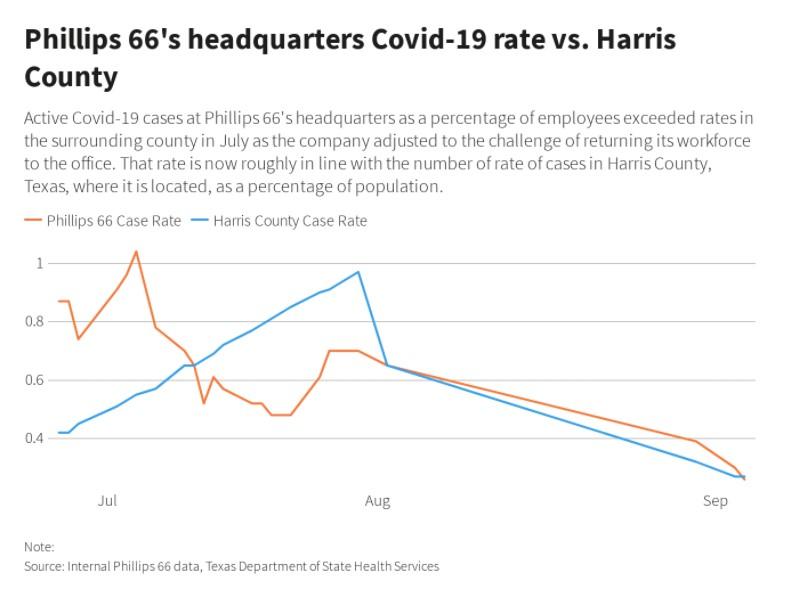While Most Companies Went “Work From Home”, Houston’s Phillips 66 Implemented A “Work From Work” Policy
Tyler Durden
Wed, 10/07/2020 – 18:00
Phillips 66 went against the grain during the midst of the coronavirus pandemic. While the rest of the world was encouraging its employees to work from home, the oil company instead instituted a “work from work” policy for its Houston headquarters, despite the fact that the surrounding area was experiencing a Covid-19 outbreak.
The move helped hold white collar workers to the same standards as the company’s refinery staff, who didn’t have a choice to work from home, Reuters noted.
And while the company was mostly able to sidestep the outbreak while remaining full staffed, some employees were left “feeling bruised” and the decision has taken its toll on morale. Several employees that spoke to Reuters said that the idea made them feel like they were put at risk – and others noted that executives and senior managers were “kept safer” via the use of private elevators and offices.

Additionally, the company wasn’t totally able to sidestep Covid. In fact, Phillips 66 at one point saw a rise in infections that “was almost twice that of the per capita rate of Harris County where the headquarters is based.” On July 8, 24 employees were listed as active cases, representing about 1.04% of the 2,300 workers on site.
As the months drag on and the price of oil continues to be under pressure, despite warnings to short sellers from Saudi Arabia, Phillips 66 has seen its stock under pressure. PSX traded above $100 to start the year and now trades at about half that, closing recently at $51. CEO Greg Garland told employees in a May video that the company had “bled $1.6 billion in cash” in Q1.
By June, most employees had been recalled back to work.
One employee said: “They’ve always said employees’ health and welfare came first. Pre-COVID, I would say that was true… Now the attitude is we don’t care about you. We just care about our company, our stock price and our dividend.”
Another former employee said the company’s decision to keep people at work contributed to him leaving the company.
And company police is different from other players in the industry, like Chevron, who has kept its headquarters at 25% capacity. ConocoPhillips had allowed its staff to stay home until last week, also.
Scott Packard, chief communications officer for Houston’s health department, said: “People should minimize contact with others whenever possible and avoid leaving home except for essential needs. [To mitigate risk] employers should provide telecommuting options to the extent possible and follow public health guidelines.”
Phillips 66 spokesman Dennis Nuss responded: “[Phillips 66] is committed to the safety of everyone who works in our operating facilities and offices. [The company] supports our decision that our dedicated employees can and have safely returned.”
“Our intent is to not address employees’ feedback through public channels,” he continued. He also noted the company spent $400,000 in PPE for its employees. “The change in protocols did not impact the relatively low number of cases in the office, although we believe the more frequent use of face coverings made it easier for employees to remember to utilize them both inside the office and away from the workplace,” Nuss concluded.
And not everybody hates the idea. Another employee, Bryan Kaus, wrote in a blog post in May that a return to work had “been good in many ways” because it “created a sense of normalcy and optimism.”
Kaus wrote: “It was surprising to see a packed elevator, people shaking hands, and eating together.”
